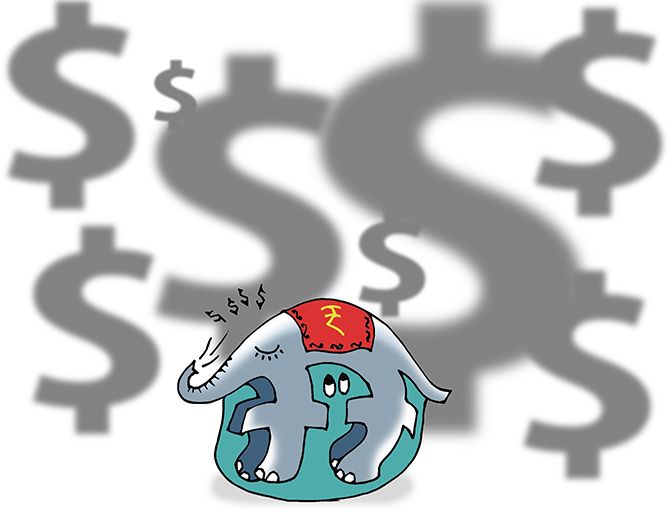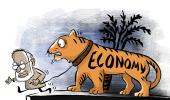The deficit increased to $ 57.2 billion or 2.1 per cent of gross domestic product (GDP) in 2018-19 as against 1.8 per cent in the previous year.
Illustration: Dominic Xavier/Rediff.com

The government is expected to further ease the foreign direct investment (FDI) norms with a view to bridge the widening current account deficit (CAD), according to the Economic Survey 2018-19.
"Government policies are expected to further lift restrictions on FDI inflows, which will continue to increase the stability of sources funding the current account deficit," the survey, tabled in the parliament on Thursday.
It said that from a macro-economic perspective, the deterioration of CAD may be contained if consumption slows in the economy while increase in investment and exports become the new drivers of the Indian economy.
The deficit increased to $ 57.2 billion or 2.1 per cent of gross domestic product (GDP) in 2018-19 as against 1.8 per cent in the previous year.
The CAD, which is the net of foreign exchange inflows and outflows, had stood at $ 48.7 billion in 2017-18.
It said the widening of CAD has been driven by a deterioration of trade deficit from 6 per cent of GDP to 6.7 per cent across the two years.
Rise in crude prices in the fourth quarter of 2018-19 and a decline in the growth of merchandise exports have led to the deterioration of trade deficit, it added.
FDI inflows into India have dipped marginally by one per cent to $ 44.37 billion in 2018-19.
The survey stated that among the major economies running current account deficit, India is the largest foreign exchange reserve holder and eighth-largest among all countries of the world.
"India's external debt was $ 521.1 billion at end-December 2018, 1.6 per cent lower than its level at end-March 2018.
“The key external debt indicators reflect that India's external debt is not unsustainable," it added.
Further, talking about India's exports, it said the composition of exports and import basket has almost remained unchanged in 2018-19 over 2017-18.
Petroleum products, precious stones, drug formulations, gold and other precious metals continue to be top export items.
Crude petroleum, pearl, precious, semi-precious stones and gold remain as top import items.
"Heightened US-China trade tensions has been stated as one of the reasons behind the global slowdown that has spilled into other economies including India through the channel of exports," it said.










